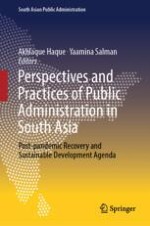This edited volume bridges the gap between theoretical underpinnings of South Asian public administration and practices on the ground to understand the future path of public administration in the region. The ten chapters highlight the post-covid contemporary trajectories of public administration and the civil society in Bangladesh, India, Pakistan, and Sri Lanka. In addition, each case study is tied to a relevant UN Sustainable Development Goal (SDG), using the SDG framework to provide useful insights for transfer of knowledge and learning within the South Asian region and highlight the “South- South” and “South-North” exchange. Illustrating the unique challenges and opportunities faced by South Asian countries post-pandemic, this volume will be of interest to scholars and students of public administration, governance, South Asian politics, and the SDGs.
